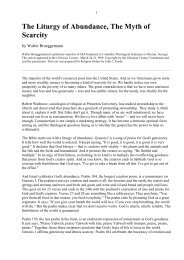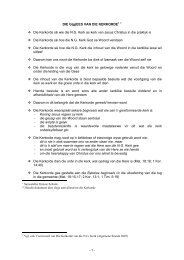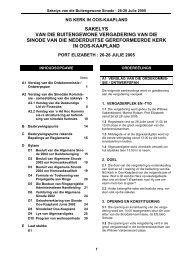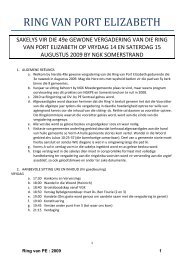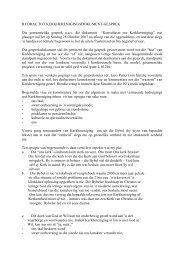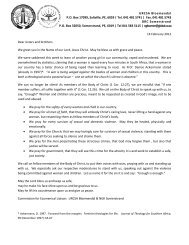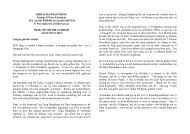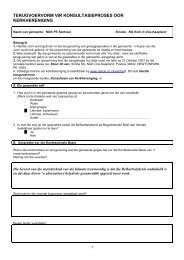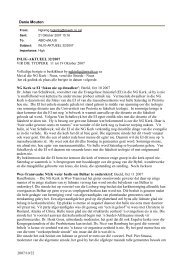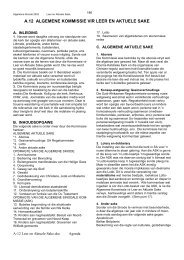You also want an ePaper? Increase the reach of your titles
YUMPU automatically turns print PDFs into web optimized ePapers that Google loves.
to emerge from former colonies are subject to new k<strong>in</strong>ds of economic and political dependency which br<strong>in</strong>g<br />
grow<strong>in</strong>g misery upon their peoples. Even though the Cold War has ended and the nuclear arms race has<br />
been slowed down, wars are still be<strong>in</strong>g fought. New sources of violent conflict have emerged from racial<br />
and ethnic tensions. Even though <strong>in</strong>ter-religious encounter and dialogue have become more common,<br />
religious loyalties cont<strong>in</strong>ue to be used to foment hatred and violence. Despite nearly universal legal and<br />
constitutional guarantees of religious freedom, the situation of religious m<strong>in</strong>orities, <strong>in</strong>clud<strong>in</strong>g some Christian<br />
churches, has <strong>in</strong> fact become <strong>in</strong>creas<strong>in</strong>gly precarious <strong>in</strong> many places; elsewhere, the very pr<strong>in</strong>ciples of<br />
religious freedom are be<strong>in</strong>g challenged or have given rise to new conflicts. Where cruder expressions of<br />
militarism have receded, they have often been replaced by more sophisticated forms of military<br />
predom<strong>in</strong>ance supported by high technology. International solidarity is giv<strong>in</strong>g way to fear and xenophobia<br />
as the numbers <strong>in</strong>crease of those leav<strong>in</strong>g their homelands to escape oppression, conflict or chronic poverty<br />
and unemployment. As the gap between rich and poor widens, the situation of more and more millions of<br />
people is disregarded and even entire nations are treated as expendable. Violence is <strong>in</strong>creas<strong>in</strong>g<br />
everywhere, with children and women its pr<strong>in</strong>cipal victims. Political <strong>in</strong>stitutions at every level are rapidly<br />
los<strong>in</strong>g the confidence of citizens who perceive them as corrupt and out of touch; and their decision-mak<strong>in</strong>g<br />
role is <strong>in</strong>creas<strong>in</strong>gly subord<strong>in</strong>ated to the demands of global bus<strong>in</strong>ess empires whose accountability is<br />
measured only <strong>in</strong> terms of the profits they earn. The grow<strong>in</strong>g awareness of threats to the earth's ecology is<br />
not matched by a will to make radical changes <strong>in</strong> life-styles and forms of production. The contemporary<br />
global crisis has moral and spiritual dimensions no less profound than the crisis which faced the world <strong>in</strong><br />
the earliest stages of the ecumenical movement. But the moral foundations of human community have <strong>in</strong><br />
the meantime become even more fragile.<br />
1.8<br />
The challenge of what it means to be part of the universal church of Christ is posed <strong>in</strong> new and dramatic<br />
ways by the process of grow<strong>in</strong>g globalization. Every church must beg<strong>in</strong> its exam<strong>in</strong>ation of its ecumenical<br />
relationships by self-exam<strong>in</strong>ation: <strong>in</strong> its life and witness <strong>in</strong> this global context has it been consistently guided<br />
by the common call<strong>in</strong>g to unity, mission and service? Has it drawn the consequences of the communion it<br />
has experienced, the widen<strong>in</strong>g of the common vision it has ga<strong>in</strong>ed, the commitments it has accepted? In<br />
fact, many <strong>in</strong>dications suggest that a grow<strong>in</strong>g denom<strong>in</strong>ationalism is re<strong>in</strong>forc<strong>in</strong>g the tendency of churches to<br />
concentrate on their <strong>in</strong>ternal and <strong>in</strong>stitutional concerns at the expense of their ecumenical commitment. In<br />
respond<strong>in</strong>g to the call to mission and evangelism churches too often ignore their commitment to common<br />
witness and thus <strong>in</strong>troduce or promote divisions with<strong>in</strong> the Christian family. While Christians and churches<br />
should be advocates of the rights and dignity of those marg<strong>in</strong>alized and excluded by society, there are<br />
shameful examples of complicity with structures of social and economic <strong>in</strong>justice. Nor has the World<br />
Council of Churches <strong>in</strong> its struggles for justice and human rights been able to act and speak accord<strong>in</strong>g to<br />
the same criteria everywhere.<br />
1.9<br />
Many churches and Christian communities, <strong>in</strong>clud<strong>in</strong>g some whose witness is vital and whose growth is<br />
rapid, have rema<strong>in</strong>ed outside the fellowship of formal ecumenical bodies. New sources of division have<br />
appeared both with<strong>in</strong> and among churches. In some churches, th<strong>in</strong>gs which have been said or done<br />
ecumenically have proved so contentious that ecumenical commitment is itself rejected as heretical or even<br />
anti-Christian. At every level, from the local to the global, churches and ecumenical bodies have found<br />
themselves <strong>in</strong> competition with each other when they ought to have cooperated.<br />
Refocus<strong>in</strong>g our understand<strong>in</strong>g<br />
1.10<br />
These limitations, setbacks and failures call the ecumenical movement and the fellowship of churches <strong>in</strong><br />
the World Council of Churches to repentance and conversion, renewal and reorientation as a new<br />
millennium approaches. If a new generation is to make its own the commitment expressed <strong>in</strong> Amsterdam,<br />
the understand<strong>in</strong>g of the place and role of the WCC <strong>in</strong> the ecumenical movement must be given new focus.<br />
What are the dist<strong>in</strong>ctive marks of ecumenical commitment that make it different from, even though related<br />
to, the many cooperative <strong>in</strong>itiatives to be found <strong>in</strong> civil society? What is the particular role of the WCC as an<br />
organization <strong>in</strong> its relationship to other partners <strong>in</strong> the ecumenical movement? How has the understand<strong>in</strong>g<br />
of the purposes and "common call<strong>in</strong>g" of the WCC changed <strong>in</strong> the light of what has been learned dur<strong>in</strong>g five<br />
decades of life together? What can be learned from the signs of new ecumenical vitality among movements<br />
of lay people, women and youth<br />
1.11<br />
The answer to such questions will draw on the <strong>in</strong>sights of the many men and women who have wrestled<br />
with them before.<br />
1.12<br />
In 1950, the WCC Central Committee, meet<strong>in</strong>g <strong>in</strong> Toronto, formulated a text on "The Church, the<br />
Churches and the World Council of Churches", which rema<strong>in</strong>s foundational for any common understand<strong>in</strong>g<br />
of the Council. This "Toronto Statement" is <strong>in</strong> two parts. The first makes five declarations about what the<br />
WCC is not:<br />
The WCC is not and must never become a superchurch.<br />
The purpose of the WCC is not to negotiate unions between churches (which can be done only by<br />
the churches themselves).<br />
The WCC cannot and should not be based on any one particular conception of the church.<br />
Membership <strong>in</strong> the WCC does not imply that a church treats its own conception of the church as<br />
merely relative.<br />
ÏÓÓ



